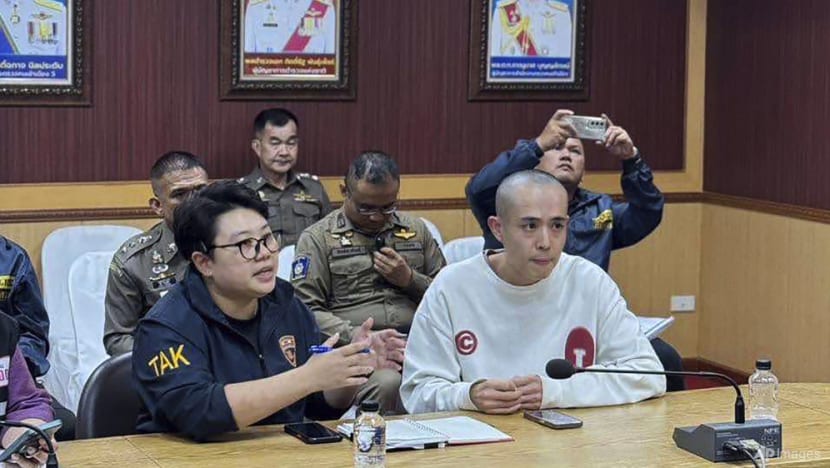Wang Xing: Thai police investigating two more missing Chinese nationals amid human trafficking concerns
A male model has been unaccounted for since late December while a young woman has been reported missing since earlier this week.

Yang Zeqi (left) and Wu Jiaqi (right), both Chinese nationals, have been reported missing after travelling to Thailand. (Photo: Weibo/古德牟宁, Douyin/钢铁战士小白)
SINGAPORE: Thailand police have launched investigations into the disappearances of two more Chinese nationals amid human trafficking concerns, with one case bearing similarities to that of rescued Chinese actor Wang Xing.
Wang, also known by his stage name Xing Xing, disappeared after travelling to Thailand and was found on Tuesday (Jan 7) near the border of Myanmar in an area where online scam networks operate. Thai police have said he was a victim of human trafficking.
One case involves a male model named Yang Zeqi who went missing in late December, while the other involves the disappearance of a young woman, Wu Jiaqi, whose case was brought to the attention of the Thai police this week, Thai news site The Bangkok Post reported on Friday.
In Yang’s case, his relatives had posted about his disappearance on social media and sought help, according to the inspector-general of the Royal Thai Police Office Thatchai Pitaneelaboot.
The sequence of events was posted on Chinese microblogging platform Sina Weibo on Wednesday by a user, Mou, claiming to be Yang’s cousin.
According to Mou, Yang came across an audition notice on Dec 8 for a film production in Thailand. He had shared the casting call with his friends, but they did not sign up due to conflicting schedules.
Yang passed the audition and left Beijing for Bangkok on Dec 20 for the shoot. According to Mou, he was picked up from Suvarnabhumi Airport in a vehicle arranged by the alleged film crew before being taken to the Thai-Myanmar border.
A day later, Yang reportedly sent a distress message to his friends before losing contact. The next time he made contact was on Dec 29, when Yang made a video call to his mother to report that “he was safe”.
But during the call, his mother noticed that there were "obvious scars on the corner of his eyes" and his condition was "not good", Mou said. Yang's friends have since contacted the Chinese police, as well as the Chinese embassies in Thailand and Myanmar.
"We saw that Wang's case was extremely similar to (my cousin's), so I have no choice but to ask for help from the internet, and also to contact Wang's family members to help rescue my cousin,” Mou wrote on Weibo.
In Wu’s case, the 21-year-old university graduate lost contact with her family shortly after arriving in Thailand on Jan 6, reported Thai news outlet Khaosod English.
According to Wu’s father, it was her first trip abroad, and she was travelling with a Chinese friend she had known for less than a month through social media.
Wu landed in Thailand at about 4am and contacted her mother via WeChat, sharing her location and plans to stay in the Don Mueang area, according to the Khaosod report.
Her mother had warned the student about travelling to Myanmar, but Wu had reassured her that she “wouldn’t dare to go to Myanmar”. Contact with Wu was lost at about 4pm.
Investigations revealed that a car had picked Wu up at Suvarnabhumi Airport and took her to a hotel in the Lat Krabang area. Hotel records show that Wu checked in at 5am and checked out four hours later, Khaosod reported.
Wu’s father personally flew to Bangkok to request assistance from the Royal Thai Police on Wednesday, according to Khaosod.
LURED BY THE PRETEXT OF OPPORTUNITY
The latest developments have once again directed the spotlight on scam centres in the region - particularly Chinese nationals being lured to Southeast Asian countries on the pretext of high-paying jobs, only to be forced into slave-like working conditions in cyber scam centres run by criminal organisations.
In Wang’s case, the actor told police he was lured by a promise of a job casting by a major Thai entertainment company. Instead, he was taken across the border into Myanmar, where police believe he was put to work in a call scam operation targeting Chinese people.
Speaking to the Thai police and local media on Tuesday, Wang recounted that there were about 50 people in one of the buildings he was held in.
Like him, all had their heads shaved, he told police. There was also an even bigger building, with more people from different countries held inside, according to Wang.

Wang has since been rescued and is expected to arrive back in China on Friday. But his ordeal has prompted similar calls for help from fellow Chinese who believe their loved ones are trapped in Myanmar and are potentially victims of human trafficking.
Chinese state news agency ECNS reported that on the same day Wang was rescued, a group chat of 487 people began compiling information on their missing relatives.
The online document is titled “United appeal for 174 ‘xing xing’ trapped in Myanmar”, a reference to Wang’s stage name Xing Xing.
The document indicates that most of the missing persons are aged between 17 and 35, with men being the majority, reported the state-run Global Times. According to the document, they have been missing for a few months to three years.
CONCERNS AMONG CHINESE TOURISTS
Wang’s case has also sparked fears among Chinese tourists who were planning to visit Southeast Asian nations, including Thailand.
Discussions on the safety of travelling to Thailand have kicked off on Chinese social media, with many users dissuading others not to head there. Questions such as “Is travelling to Thailand safe?” have garnered 143,000 posts on popular social media platform Xiaohongshu.
One post, with more than 35,200 likes, warned Chinese tourists not to visit Thailand in the “short term” and alleged that any jobs that do not require a working visa are all scams.
“I’m a bit scared, I’ll be travelling to Thailand in a few days, hope that I’ll be fine,” one user, Dora, wrote.
“Can’t you not go? Your life is more important than having fun,” another user replied.
The Tourism Authority of Thailand has targeted welcoming a total of 9 million visitors from China in 2025, achieving at least 90 per cent of pre-COVID numbers, local news site The Nation reported. Chinese arrivals reached a record high of 11 million in 2019.
The authority has said it is working to restore confidence among Chinese tourists. Its governor, Thapanee Kiatphaibool, acknowledged the incident’s impact on Chinese netizens but stated it had not yet affected Thai tourism, The Nation reported.
Even Wang himself doesn’t appear to be letting his ordeal sour his impression of Thailand. Speaking to local media in Mandarin on Wednesday after arriving in Bangkok, he thanked Thai authorities while also expressing confidence in the country’s safety.
“Thailand is pretty safe, everyone please do not be worried. If there is a chance in the future, I would want to return to Thailand,” Wang said.
















